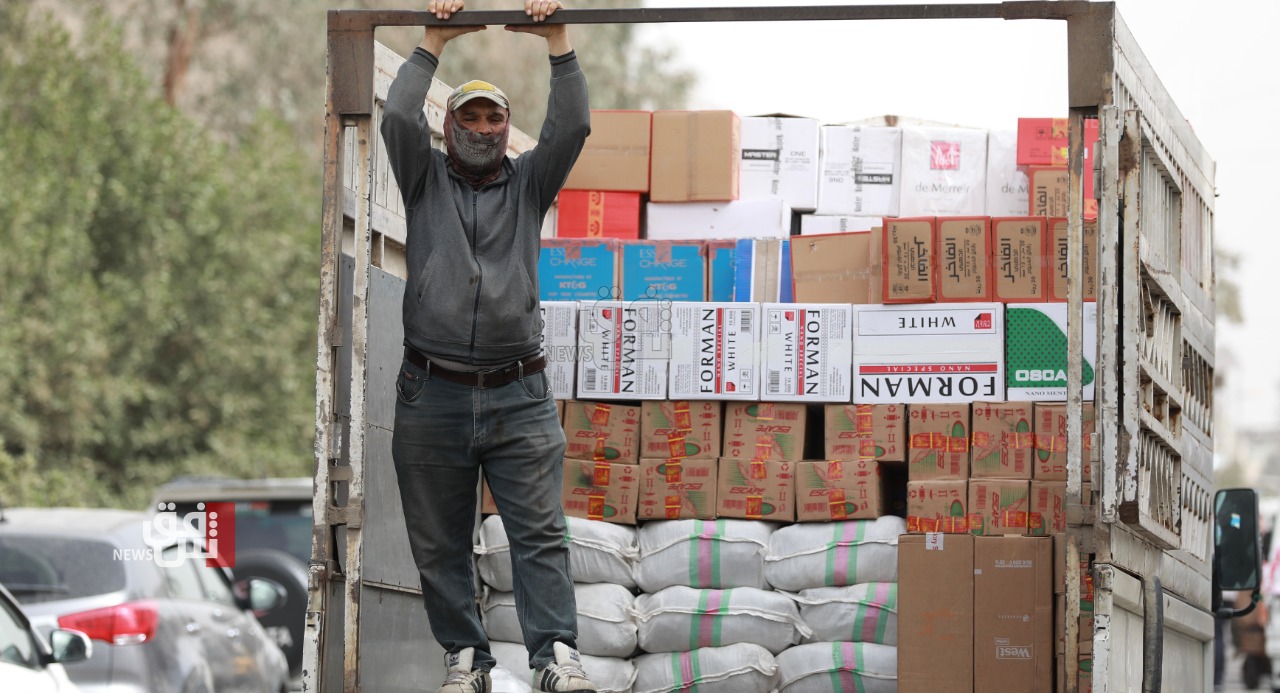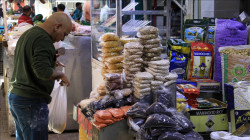The Russian-Ukrainian war echoes in Iraqi markets: soaring food prices

Shafaq News / Although Iraq is not a party in the Russian-Ukrainian war waged overseas and the Iraqi government has not announced whether it is batting for one side or the other, Iraqi traders seemed quite eager to bring food prices into the midst of the fighting to make double profits at the expense of the citizen.
With the Russian invasion of Ukraine, world food prices rose to record highs as exports from the Black Sea region known as the "breadbasket" were disrupted in line with the gradual rises of food crops due to global climate change.
As a result, the prices of grains and vegetable oils have surged, which impacted Iraq as the world's most food importing country.
Local markets have seen a steady rise in food prices, particularly vegetable oil, which rose to 4,000 dinars, up from 2,500 dinars per liter. Rice also rose to 2,250 dinars per kilogram, while bakeries started selling six loaves of bread for 1,000 dinars.
"The big price hike in Iraq started after changing the exchange rate of the dollar, and the rest is complementary to this rise," Abdul Rahman al-Mashhadani, an economist at the Iraqi University, told Shafaq News agency.
"The reason for this price surge is the war between Russia and Ukraine, as they provide 60% of the bread flour, as well as large quantities of corn and sunflower oil," he said.
"The rise will damage the society, especially the poor who have not received sufficient support to deal with such crises. Furthermore, Ramadan month is around the corner. Therefore, the government has to intervene to provide and distribute the ration card; otherwise, prices will continue to rise significantly."
Drought and COVID-19..
"The rise in food prices came before the Ukrainian war, where droughts and closure measures that followed the COVID-19 pandemic in some countries led to a decline in agricultural production," economist Dhurgham Mohammad Ali stated to Shafaq News agency.
He continued, "However, the war in Ukraine and the subsequent boycott of Russia have led to a further shortage of grain crops and vegetable oil supplies, which have directly affected food prices globally."
"As Ramadan approaches and demand increases, prices are skyrocketing locally and globally, putting pressure on the low-income."
Monopoly under the pretext of protection..
Mohammed Abdul Hussein, a trader in The Jamila Industrial area - Iraq's most important food, fruit, and vegetable center - told Shafaq News agency that the rise in food is now attributed to the increased price of raw materials globally, as well as the monopoly of some companies on certain food items in Iraq.
"Traders are currently unable to import vegetable oils under the pretext of protection of the local product, as vegetable oil is canned in Iraq, whether Zer oil or al-Dar oil."
"The war in Ukraine, which supplies wheat and food oils, has led to a rise in these goods, while the increase in the dollar was the cherry on top, as it doubled the prices of shipping and transportation," he added.
Trade Ministry reassures..
"There is enough wheat to meet the ration card need until the completion of marketing the local wheat, which will start next May," explained Mohammed Hannoun, director of the Iraqi Ministry of Trade's General Grain Trading Company.
"Iraq has good quantities of local wheat that will be included in the ration card. Also, contracts had been reached to buy wheat from the Canadian and U.S. markets," Hannoun added, "Two shipments of Australian wheat will arrive in the next two weeks."
"The rest of the food included in the food basket is also available and will be distributed in turn without any delay."
"The current high prices in local markets will have little impact as the food basket continues to be distributed to citizens."
Ever rising flour price..
"Wheat flour has not stopped rising over the past period to reach 55,000 dinars per sack, up from 43,000 dinars. Therefore, selling eight loaves for 1,000 dinars is causing us losses, especially since we have to pay other expenses such as rent, workers' wages, electricity, and others," the owner of a bakery in Baghdad's Karrada area complained to Shafaq News agency.
He also called on the government to support them with flour, even if it is partial until the end of the crisis, "Government subsidies for bakeries will provide suitable prices and larger loaves of bread for the citizen."
On the other hand, many citizens considered the Trade Ministry's talk about distributing the food basket "futilely" to curb the street's anger.
"The Ministry is emitting nothing but empty words," Mohammed al-Hasani told Shafaq News agency, adding, "Over the past years, the Trade Ministry has not been able to fairly and continuously distribute the ration card materials."
"The corruption in the ration card is greater than the ability of the ministry to distribute these materials, whether regarding its employees or the agents distributing those items."
For his part, Hussain al-Khafaji told Shafaq News agency, "What we are seeing in local markets is inexplicable as the prices of all food have risen, contrary to what is being said that only flour and vegetable oils have been affected by the war in Ukraine."
"Traders exploit such crises to get obscene profits, and the state is unable to protect the citizen due to its failure to distribute the food basket continuously," he added.
Russia and Ukraine play a pivotal role in providing food, together accounting for about a quarter of shipments of wheat, barley, one-fifth of maize, and the bulk of sunflower oil.
With large quantities of the region's supplies interrupted, buyers will have to look elsewhere. However, some importers are struggling to secure supplies amid high prices and low shipping offers.
The United Nations Food and Agriculture Organization (FAO) stated in January 2022 that global food prices rose 28% in 2021 to their highest levels in 10 years and that hopes are little of a return this year to more stable market conditions, warning that rising prices were putting poorer segments at risk in import-dependent countries.
The prices of grains, vegetable oils, butter, pasta, beef, and coffee skyrocketed at a time when farmers around the world are facing a range of challenges, including drought, blizzards that have destroyed crops, high fertilizer and fuel prices, and labor shortages due to the COVID-19 pandemic.
To top it all, the crisis further worsened after the supply chain disruptions in some of those crops due to the war in Ukraine, which, together with Russia, is one of the world's largest exporters of wheat, vegetable oil, and feed.





